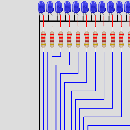Introduction: Best Free Online Wokwi Arduino Simulator - Why Is This Special?
There are many Arduino simulators out there. Many are outdated and a few are limited with the options (unable to support third-party libraries, for example). to overcome most of the disadvantages, the wokwi Arduino simulator was started. instead of comparing with any particular available simulator, we will compare wokwi Arduino simulator with an ideal Arduino Simulator😀
In the next step, we will see what are the ideal features of an Arduino Simulator👉👉
Supplies
Browser with internet access
Step 1: What Are the Useful Features to Be Present in an Arduino Simulator?
A good Arduino simulator should have these features:
- Support multiple file projects📁📂📂🗄🗃 (*.h, *.cpp and more)
- It should be able to use Arduino libraries (not just a few😟 but all😀)
- Latest🆕 Arduino version should be used by default (Reason and more info)
- Support various trending projects which have many users - FastLED support, OLED, TFT colour LCD, NeoPixel 🤩 and more
- Arduino Mega simulations and Arduino nano simulations
- Examples for Demo projects (for example: famous libraries on GitHub)
- Should be able to run on multiple platforms - Windows, Mac as well as Android (Mobile devices 📱)
- Sharing🌏🌐 options so that it will be easy to share code with others (to get help, to get a review or some additions done)
- Be Smart
- Support code auto-complete
- support code formatting
- special useful debug features (example FPS and LED 🚥💡⚡Watt indicator for LED projects) etc
- Features provided should not be limited
- In one other simulator, some NeoPixel Arduino projects have limitations👎 on the number of LEDs that can be connected
- Simulated parts: A good Arduino simulator is as good as the number of useful simulated elements it has. If the simulated elements are less, either the project will be handicapped or there will be less motivation.
- Support- There is no software tool which will be free of bugs or which will be in need of improvements. There should be a commitment from the developers to keep the tool up-to-date and also respond to the users in a timely manner. A tool which stops updating is a no go
PS:
Step 2: How Many Files and Filetypes Are Supported in Wokwi Arduino Simulator?
There is always a need to add more functions to the project which will be done via the library. this will provide more useful features to the existing projects as well. Wokwi Arduino simulator supports library files written in C *.c, CPP *.cpp and the header *.h files, without any restrictions.
Other file types supported by standard Arduino IDEare also supported.
Many simulators fail here as they either support only built-in libraries or doesn't support the external libraries at all. This is a disadvantage of using other simulators because in this world of open-source there are so many useful libraries out there for multiple projects, it will be a big loss for a learner to not to have the ability to play with them.
Also, the cherry on the cake is that the Simulator supports code-formatting as well as auto code completion. It gives a user motivation to continue and complete the job. Also, readability will be improved
Step 3: How Does Wokwi Arduino Simulation Always Uses Latest Arduino Version?
Wokwi doesn't ask you to download any software package
it also doesn't need any installations
These two steps are avoided making the user free of maintenance work (frequent updates or outdated IDE usage are upfront avoided)
Step 4: What Are Some Interesting Library Examples Wokwi Hosts?
Wokwi Arduino simulator has many built-in examples listed on exciting modules such as NeoPixels, OLEDs and more. Here are a few examples:
- NeoPixel library from Adafruit:
https://wokwi.com/arduino/libraries/Adafruit_NeoPi...
- SSD1306 OLED display library from AdaFruit
https://wokwi.com/arduino/libraries/Adafruit_SSD13...
- DHT sensor library from Adafruit as well
https://wokwi.com/arduino/libraries/DHT-sensor-lib...
- FastLED examples from various contributors on GitHub (all references to the original author provided)
https://wokwi.com/arduino/libraries/FastLED
- Servo motor and potentiometer examples
https://wokwi.com/arduino/libraries/FastLED
and many more.
Bottom line is that the Wokwi Arduino simulator makes learning easier with the ample amount of good examples provided to get one started🏇.
PS:
Step 5: Arduino UNO, Arduino Mega, Arduino Nano? - All Ready to Compile 😎
Wokwi Arduino simulator as such supports not only Arduino UNO but also Arduino Mega and Arduino nano. Other Arduino variants will also be supported in the near future based on requirements, down the line.
many FastLED applications use Arduino Mega (it has more RAM than UNO) for various animations and graphics (which demand higher RAM due to heavy libraries).
Arduino Nano provides the same computing power at lesser size making it more preferable for wearables or smaller gadgets
Step 6: Will Wokwi Arduino Simulator Run on All Platforms?
This is also a unique point about the Wokwi Arduino Simulator. It can run on windows, Mac and also on smartphones. Since it runs right in the browser, I always use my free time during a travelling to run simulations on my mobile as well. Though editing on the mobile will be a little difficult in the beginning. The windows resize automatically to give the best experience though.
PS:
Step 7: Contacts, Future Updates and Other Information on Wokwi Arduino Simulations
People are already building interesting things using Wokwi Arduino Simulator platform. A simple blog page with the summary and links is here
______________
Please follow wokwi Arduino simulator on Twitter and Facebook
https://twitter.com/wokwimakes?lang=en
Please ask questions, share suggestions and help make this open-source simulator better!
Please follow on Twitter for updates and useful tips 💡
Wokwi Facebook page link is given below






